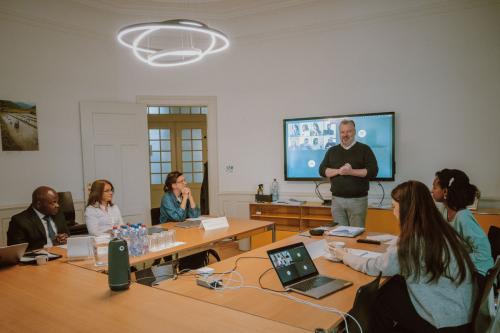Managing public investments in infrastructure: novel course in Peru connects theory and practice

Better management of public infrastructure projects could save significant amounts of taxpayers’ money and result in better buildings, roads and bridges. But the public officials managing the projects are often unaware of academic frameworks and tools that could help them to manage the investments more efficiently and transparently.
A new academic course developed by our Subnational Public Finance Management Strengthening Programme (Programa GFP) and the University of Piura seeks to address that issue for public officials in Peru.
Focused on public procurement and infrastructure, the course is designed to enhance the skills of public officials by providing them with academic insights that are directly applicable to their work. In this way, the course connects academic knowledge with real-world practice.
Delivered virtually to meet the needs of officials working across Peru, the course covers the intricacies of project implementation, from bidding processes to completion. Fourty-one representatives of local governments received scholarships from the Swiss SECO Cooperation in Peru to attend the first edition of the course, which began in January 2024.
Public investments at risk
Investment in infrastructure is a fundamental fiscal tool for promoting a country’s growth, but it can also be plagued by problems of mismanagement and inefficiency.
According to Professor Huaita, Director of the Department of Economics at the University of Piura, most infrastructure investment in Peru takes place at the subnational level. Regions and towns across Peru could benefit hugely from public investment in basic infrastructure like hospitals, schools, transport and bridges. It is therefore especially important that potential losses and inefficiencies are minimised.
Our team’s research shows that in Peru, approximately 40 percent of potential returns from infrastructure investments are lost because of complications in managing the projects. This is especially due to delays in the awarding of public tenders and the interruption of investments during a project’s execution.
Professor Huaita comments:
"Without proper management of investments, any benefits can be substantially reduced… projects are delayed, lose funding… there is waste of resources due to inefficient procurement processes, cost overruns due to corruption, and projects do not respond to adequate territorial planning.”
From theory to practice to strengthen integrity
The new course takes a comprehensive approach to these challenges. It addresses the issues faced by local government officials in their interactions with the national investment management system.
Participants engage in real-world problem-solving scenarios under the guidance of the course facilitators, who are experts in infrastructure projects, public-private partnerships, administrative law, public contracts, management and finance. A hands-on approach ensures that participants gain practical knowledge which is directly applicable to their roles in government and can be immediately employed in their day-to-day work.
The 112-hour course will be delivered in five modules. In the breaks in between modules, participants can try out their new knowledge before returning to the class to discuss their experiences.
Learn more
- See the news item (in Spanish) on the website of our Programa GFP Subnacional. Funded by the Swiss State Secretariat for Economic Affairs (SECO) since 2015, the programme supports 11 local and regional governments in Peru to build capacity to manage public finances and to recover stolen funds.
- See the course brochure (in Spanish).
- Read a related report about the challenges of public investment at the subnational level in Peru: Desafíos para la ejecución de grandes proyectos de inversión desde los gobiernos subnacionales del Perú or see the executive summary in English.


